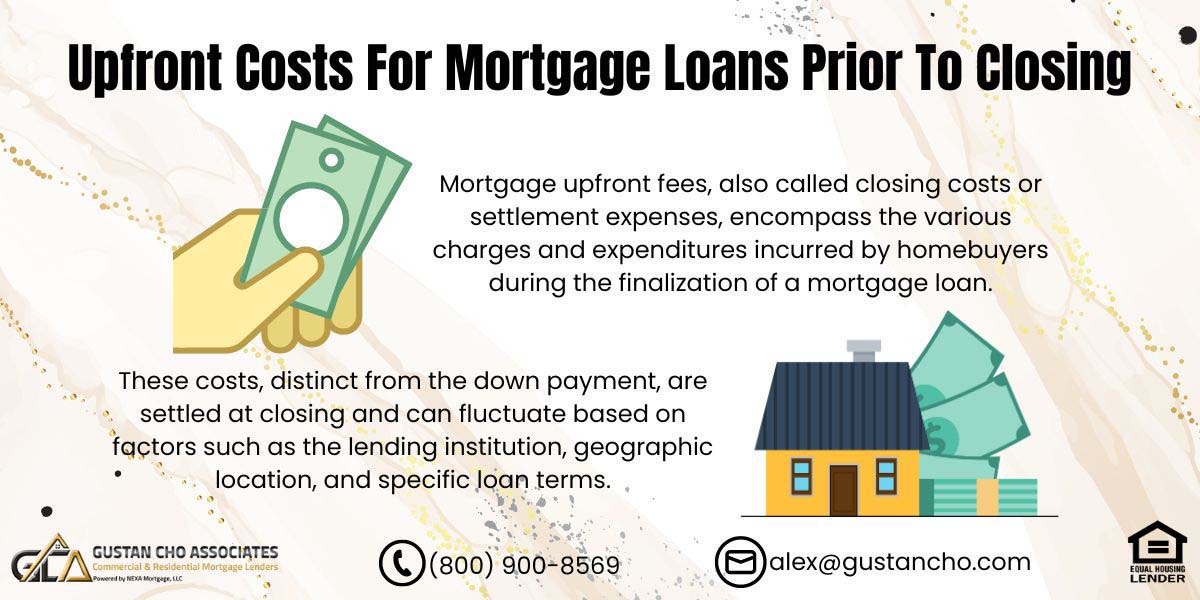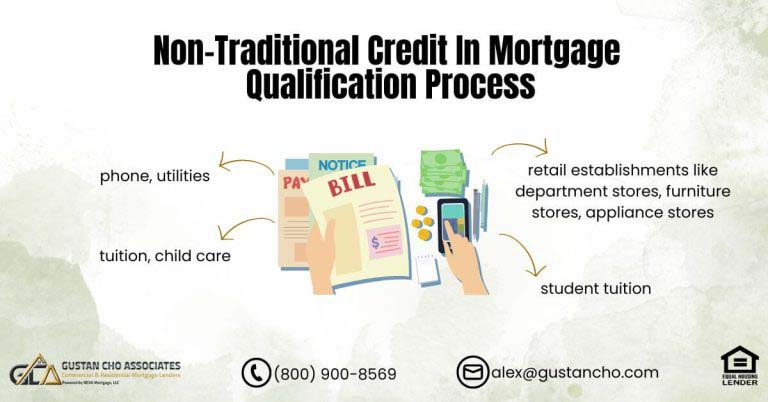This guide covers upfront costs for mortgage loans prior to closing. What would you do as a borrower if a lender asked for upfront costs for mortgage loans? The mortgage process is time-consuming and involves a lot of work for both the lender and the loan applicant. The borrower must complete a 4-page mortgage loan application, often called 1003. Once the mortgage loan application is completed, the loan originator will run credit. It is a tri-merger credit report where the credit report consists of three credit bureaus:
-
- Transunion
- Experian
- Equifax
The middle credit score is used for which credit score the mortgage lender will use for credit qualification purposes. In the following sections, we will discuss the upfront costs for mortgage loans prior to closing.
What are Mortgage Upfront Fees?
Mortgage upfront fees, also called closing costs or settlement expenses, encompass the various charges and expenditures incurred by homebuyers during the finalization of a mortgage loan. These costs, distinct from the down payment, are settled at closing and can fluctuate based on factors such as the lending institution, geographic location, and specific loan terms.
Common components of upfront fees include the loan origination fee for processing the application, appraisal expenses to assess property value, credit report charges, title search, and insurance fees to ensure a clear title, home inspection costs, attorney fees in applicable jurisdictions, recording fees for legal documentation, prepaid interest covering the period from closing to month-end, and escrow deposits to prepay property taxes and insurance premiums.
It is crucial for prospective homebuyers to meticulously examine the loan estimate provided by the lender, delineating all anticipated closing expenses, and allocate funds accordingly to accommodate these financial obligations.
Wondering What You’ll Pay Before Closing?
From appraisals to inspections, we break down all the upfront costs you can expect before your mortgage closes.Upfront Costs For Mortgage Loans: What Can Lenders Charge Upfront
Borrowers should not pay any upfront costs for mortgage loans except for appraisal fees. I have heard of some mortgage brokers who charge credit report fees upfront costs for mortgage loans, but those are very few. The only upfront costs for mortgage loans a lender can charge are a credit reporting fee and home appraisal fee, adds Alex Carlucci, a senior loan officer at Gustan Cho Associates:
If a mortgage broker or loan officer asks you for an upfront fee for them to run your credit report, go somewhere else. Most lenders will not charge anything upfront. Lenders cannot charge you any upfront costs for mortgage loans except for a third-party home appraisal fee.
If a lender asks you for upfront costs for mortgage loans, such as processing and underwriting fees, that is not legal, and they are not following proper mortgage lending rules and regulations. A lender can charge you credit reporting, processing, and underwriting fees. That needs to be disclosed on the closing disclosure. That needs to be charged as part of the closing costs at the closing of the home loan.
Do You Pay Before Closing?
Many mortgage upfront fees are typically paid before the closing date. These fees are often required to be paid upfront to cover various expenses associated with processing the mortgage loan and finalizing the home purchase. For example, the appraisal, credit report, and home inspection fees are commonly paid early in the home buying process to facilitate the mortgage approval process and ensure that the property meets lending and safety standards.
Other costs, such as the down payment and escrow deposits for property taxes and insurance, may also be required to be paid before the closing date. You will usually find that these funds are held in an escrow account until the closing date, which will be used to finalize the purchase transaction.
It’s important for homebuyers to carefully review their loan estimate and work with their lender to understand when various upfront fees and expenses are due to ensure a smooth closing process.
Documents Required To Start Mortgage Process
The loan officer will also request documents to start the mortgage process. Typical documents required are two years of tax returns, two years of W2s, and 30 days of paycheck stubs to determine qualified income. Tax returns are necessary if the borrower takes a lot of unreimbursed expenses. Federal income tax returns are not necessary unless the borrower has a 1099 side or rental property on their income tax returns, says Alex Carlucci, a senior loan officer at Gustan Cho Associates:
Unreimbursed expense figures will be deducted from the borrower’s income, and the adjusted gross income will be used to qualify for income. W2s will determine the hourly rate or salary the borrower makes.
Any deductions for itemized expenses such as child support or alimony deductions or wage garnishments and the most recent paycheck stubs are necessary to determine year-to-date income and the amount the borrower makes. Loan officers will also request asset information such as 60 days bank statements and other asset information such as 401k statements or investment account statements to determine the source of the down payment and closing costs for the home purchase.
Steps In The Mortgage Process
Again, the mortgage process is time-consuming. The mortgage process normally takes at least 30 days to close on a home loan from the date the loan officer gets the signed mortgage disclosures back to the date of the home loan closing. The mortgage lender incurs a lot of time and costs.
Credit reporting fees, processing fees, hours spent by the mortgage loan officer, hours spent by the mortgage company’s opening department, the underwriting department, the quality control department, the closing department, and the funding department. However, on every home loan, the mortgage lender does not get paid unless the mortgage loan closes and funds.
What If Borrowers Does Not Close
If a mortgage loan does not close and funded, the mortgage loan originator and the mortgage company do not get paid and cannot charge borrowers for the countless hours worked. Lenders do not work as lawyers. With attorneys, they are allowed to ask for retainers in advance. Attorneys can charge their clients for the hours they have put in.
If a case takes longer than expected, the lawyer can ask for more money from their legal clients. This is not how the mortgage business works. There are strict mortgage rules and regulations that restrict upfront costs for mortgage loans, and mortgage loan borrowers need to be aware of this.
Be Financially Ready From Day One
We’ll walk you through all upfront mortgage costs—so you’re fully prepared to close with confidence.Upfront Costs For Mortgage Loans: Am I Obligated To a Particular Lender?
Borrowers will get dozens of pages of mortgage documents once they decide to choose a particular mortgage lender. These mortgage disclosures can often be confusing with legal mumbo-jumbo terminology. Borrowers must sign and acknowledge the mortgage disclosures and sign and date them.
One thing borrowers need to realize is borrowers are protected by federal and state mortgage lending. Borrowers are not obligated to go with any particular lender. Borrowers can cancel their mortgage loan transaction until they close on their home loan.
Asking Borrowers For A Fee For Hours Worked
A mortgage lender cannot sue a borrower if the borrower cancels their mortgage loan transaction until the closing date. It does not matter if the mortgage lender has put in more than 1,000 plus hours. If a borrower is unhappy with the loan officer or the lender during the mortgage process, they can cancel their mortgage transaction and walk away. Lenders are not allowed to charge any costs or fees.
What is a Loan Upfront Deposit?
An upfront loan deposit typically refers to an initial payment made by a borrower to a lender at the beginning of the loan process. The lender often requires this deposit to secure the loan or cover certain expenses associated with processing the loan application.
The upfront deposit may be used as part of the down payment on the loan or as a portion of the closing costs. However, the specific terms and purposes of the upfront deposit can vary depending on the lender and the type of loan being obtained.
The upfront deposit is based on the borrower’s creditworthiness, loan size, and lender’s requirements. We are eager to work with you and find the best possible solution. It’s important for borrowers to carefully review the terms of their loan agreement and understand any upfront deposit requirements before proceeding with the loan application process.
If you have any questions on Upfront Costs For Mortgage Loans Prior To Closing or you need to qualify for loans with a lender with no overlays on government or conforming loans, please contact us at Gustan Cho Associates at 800-900-8569. Text us for a faster response. Or email us at alex@gustancho.com . The team at Gustan Cho Associates is available 7 days a week, on evenings, weekends, and holidays.
FAQ: Upfront Costs For Mortgage Loans Prior To Closing
-
1. What should I do if a lender asks for upfront costs for mortgage loans? If a lender requests upfront costs for mortgage loans beyond appraisal fees, it’s advisable to seek another lender. Legally, lenders cannot charge any upfront costs except for third-party expenses like a home appraisal fee. Be wary of any lender asking for upfront fees beyond these allowed charges.
-
2. What are the documents required to start the mortgage process? Typically, lenders require documents such as two years of tax returns, W2s, and 30 days of paycheck stubs to assess qualified income. Additionally, asset information like bank and investment account statements may be needed to determine the source of the down payment and closing costs.
-
3. Do I pay upfront costs before closing? Yes, many mortgage upfront fees are typically paid before the closing date. These fees cover various expenses associated with processing the mortgage loan, such as appraisal, credit report, and home inspection fees, and are often held in an escrow account until closing.
-
4. Am I obligated to a particular lender after starting the mortgage process? Borrowers must only go with a particular lender once the mortgage loan closes. Borrowers can cancel their mortgage transaction at any point before closing, and lenders cannot charge any costs or fees if the transaction is canceled.
-
5. What is a loan upfront deposit? A loan upfront deposit is an initial payment made by a borrower to a lender at the beginning of the loan process. This deposit may be used as part of the down payment or closing costs and is subject to the terms and requirements of the lender and the type of loan being obtained. Borrowers must review the terms of their loan agreement carefully before proceeding with the application process.
This blog about the Upfront Costs For Mortgage Loans Prior To Closing was updated on April 1st, 2024.










